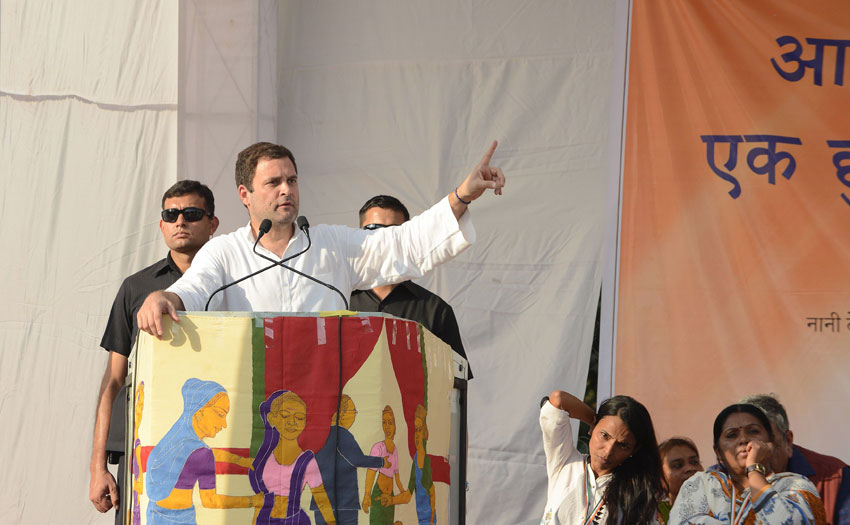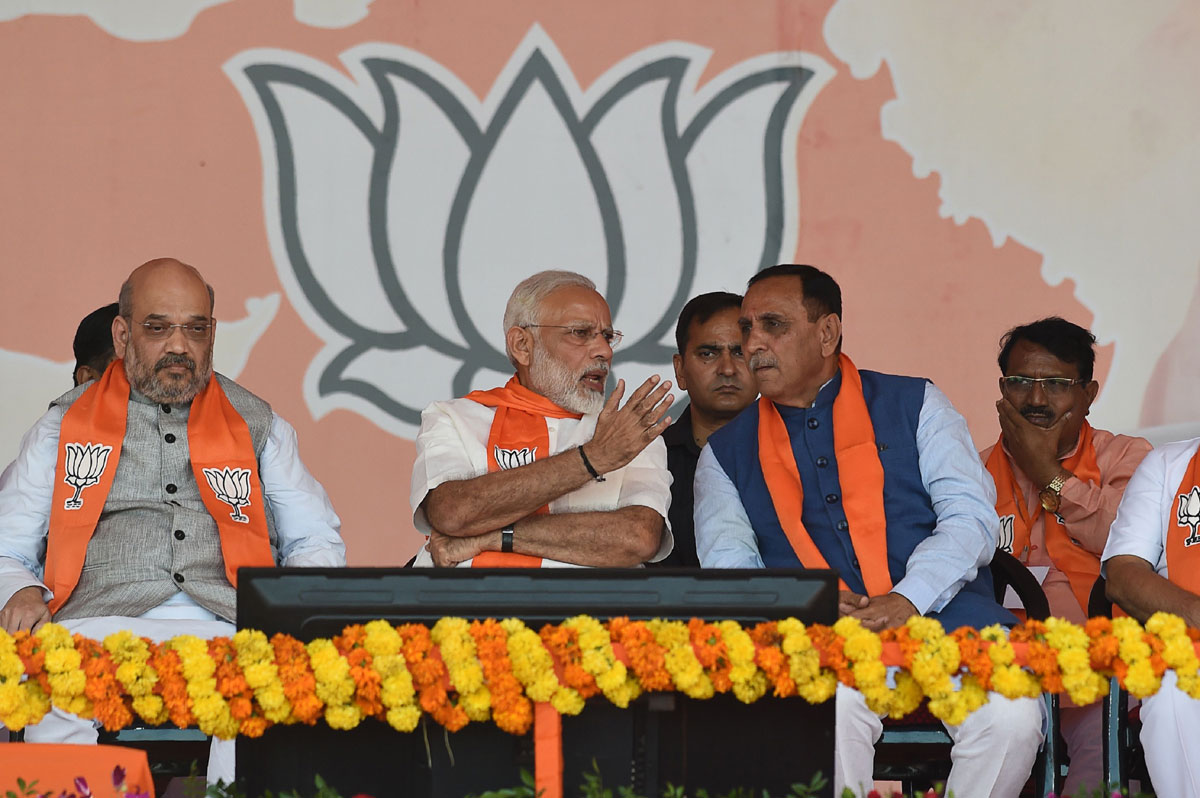The Gujarat Poll ‘Dangal’: Modi Juggernaut Versus Rahul Gandhi and Caste Allies
Indian Prime Minister Narendra Modi (c) speaks to Gujarat State Chief Minister Vijaybhai Rupani (r) in the presence of Bhartiya Janta Party President Amitbhai Shah (l) during Gujarat Gaurav Mahasamellan at Bhaat village on the outskirts of Ahmedabad, Gujarat, Oct. 16. (Sam Panthaky/AFP/Getty Images)
The 14th Gujarat legislative elections in the Bharatiya Janata Party (BJP) ruled state on the west coast are due Dec. 9 and Dec. 14, with prime contending political parties being BJP and Congress-Hardik Patel-led Patidar Anamat Andolan Samiti (PAAS) combine, writes Priyanka Bhardwaj.
This political battle has upped national anxiety as everyone watches with bated breath to see if Prime Minister Narendra Modi’s magic is able to hold on to its own in his home state as anti-incumbency and feelings of resentment unleashed by his demonetization move, other anti-black money manoeuvers and roll out of the Goods and Services Tax.
In the 2012 elections results went in favor of the incumbent BJP that won 115 out of 182 seats with a vote share of 47.85 percent and Congress came a distant second with just about 61 seats and 38.93 percent vote share.
The third Chief Ministerial stint of Modi, however, ended with his take over as Prime Minister of the country in May 2014.
But due to the agitation by Patels, Patidars and lower castes, Anandiben was forced to quit and Vijay Rupani was anointed as the BJP CM.
Banking on Modi’s direct appeal, oratory skills and charisma the BJP is seen to be leaving no stone unturned to keep voters enthused about its prospects in the state.
In the last phase of campaign the party is on an overdrive and planned and conducting 35 rallies and 27 public meetings of Modi.
The main focus of the saffron party is to paint the electoral battle as a “Modi Versus Opposition” and place emphasis on the party’s performance—jobs, economy—and unity and consolidation among castes to garner a ballot win.
It is learnt that 40 star campaigners, comprising Cabinet Ministers such as Arun Jaitley, Sushma Swaraj, Rajnath Singh and Nitin Gadkari, BJP Chief Ministers, Yogi Adityanath of Uttar Pradesh, and Vasundhara Raje of Rajasthan, will be roped in to push forward the BJP electioneering.
Interestingly veteran BJP leader L.K. Advani, Lok Sabha Member of Parliament from Gandhinagar for past 19 years, present Chairperson of BJP Parliamentary Party and a member of its Margadarshak Mandal, is conspicuous with his absence during electioneering.

If an imminent BJP loss is a far-fetched reality, going by past trends, a reduction in vote-share and number of seats it wins may not be a surprise, in comparison to previous wins.
Prominent BJP candidates in the fray include Sureshbhai Patel from Maninagar constituency that was represented by Modi in the 2012 elections, Bhupendrabhai Patel from Ghatlodia, a constituency held by Anandiben Patel, who is not contesting this time, and, Kaushikbhai Patel from Naranpura constituency that was represented by BJP President Amit Shah.
Defectors who had joined BJP have also been rewarded with tickets and they include Tejashariben Patel, the former Congress MLA, Kanu Makvana, the son of former Congress MLA Karamshi Makvana, who had crossed over to the BJP during the Rajya Sabha elections, Amitbhai Chaudhary, who had defeated a BJP candidate from Mansa constituency in 2012, Raghavji Patel, Dharmendrasinh Jadeja, C.K. Raolji, Mansinh Chauhan and Ramsinh Parmar.
Shah has declared that he aims to break Congress’ 1985 record of winning 149 seats under Madhavsinh Solanki.
In the first phase, 89 seats of Saurashtra and South Gujarat will go to polls, and 93 seats of Central and North Gujarat region will undergo elections in the second phase.
Coming on to the Congress, their poll-strategy is quite on the contrary as it seeks benefits of anti-incumbency and playing up caste differences to throw up a fractured verdict.
Well aware of the fact that upper castes have been staunch supporters of the BJP in the state, it has reached for its past strategy when in 1980 it had welded the Muslims, Dalits, tribals and Kshatriya votes to win 141 seats.
This time too it has sought caste alliances with lowers castes such as Patidars, Dalits and OBCs by latching on to the emerging Patidar leader’s PAAS, other backward classes (OBC) leader Alpesh Thakor-led Gujarat Kshatriya Thakor Sena and Chhotubhai Vasava-led Bharatiya Tribal Party (BTP).
However, it is still in the realm of possibility if Hardik, hailing from the Leuva subcaste of Patels who are in majority in Saurashtra, is able to win the loyalties of Kadva Patels that dominate the North.
Moreover, the inner circle of Hardik Patel has also left him for saffron (BJP) pastures.
The Muslims who make for 9.6 percent of the state’s population and have a sizeable presence in at least 60 constituencies have not a single candidate in the BJP list but 6 from the Congress.
But considering the Muslims, Kshatriyas, Dalits and tribals as traditional supporters of the Congress it is unclear how they may turn into “king makers” in the recent poll math.
The party’s slogans – “Congress aave che” (the Congress is coming) and “Vikas gando thayo che” (development gone crazy) and promise to cap GST at 18 percent – may find resonance with the famed business community of small and medium enterprises that faced the brunt of note and GST.
The party is dependent on prospects of its candidates who have been fielded from all constituencies barring two seats for allies and not challenging Dalit leader Jignesh Mevani, contesting as an independent from Vadgam (SC), as a gesture of support.
Alpesh Thakore, who recently joined Congress in the presence of Congress President in waiting, Rahul Gandhi, is being fielded from Radhanpur constituency in Patan district.
Important candidates from Congress include senior high court lawyer (he fought Hardik Patel’s sedition case) and party leader Babu Mangukia from the Thakkar Nagar seat in Ahmedabad city, and, former Gujarat Congress President Siddharth Patel from Dabhoi seat.
What has got the eyeballs is the frontal attack on each other by Modi and Gandhi over almost everything and their personal snipes which bares the fact that Indian politics is bereft of any idealism.
Another bewildering feature of this electioneering is that Gandhi has played the Hindu card more than Modi and his saffron brigade, a spin-off of which has been the controversy over his religion post his Somnath Temple visit.
In the end, it may be that Gujarati voters may vote for Modi in who they see as upholder of Gujarati pride at the world stage and keep the benefits of development packages from Center in full flow while Rahul Gandhi learns to rebuild and lead his party based on a new storyline that will resonate with the voters against his formidable opponents and not depend solely on reaching out to potential allies.


